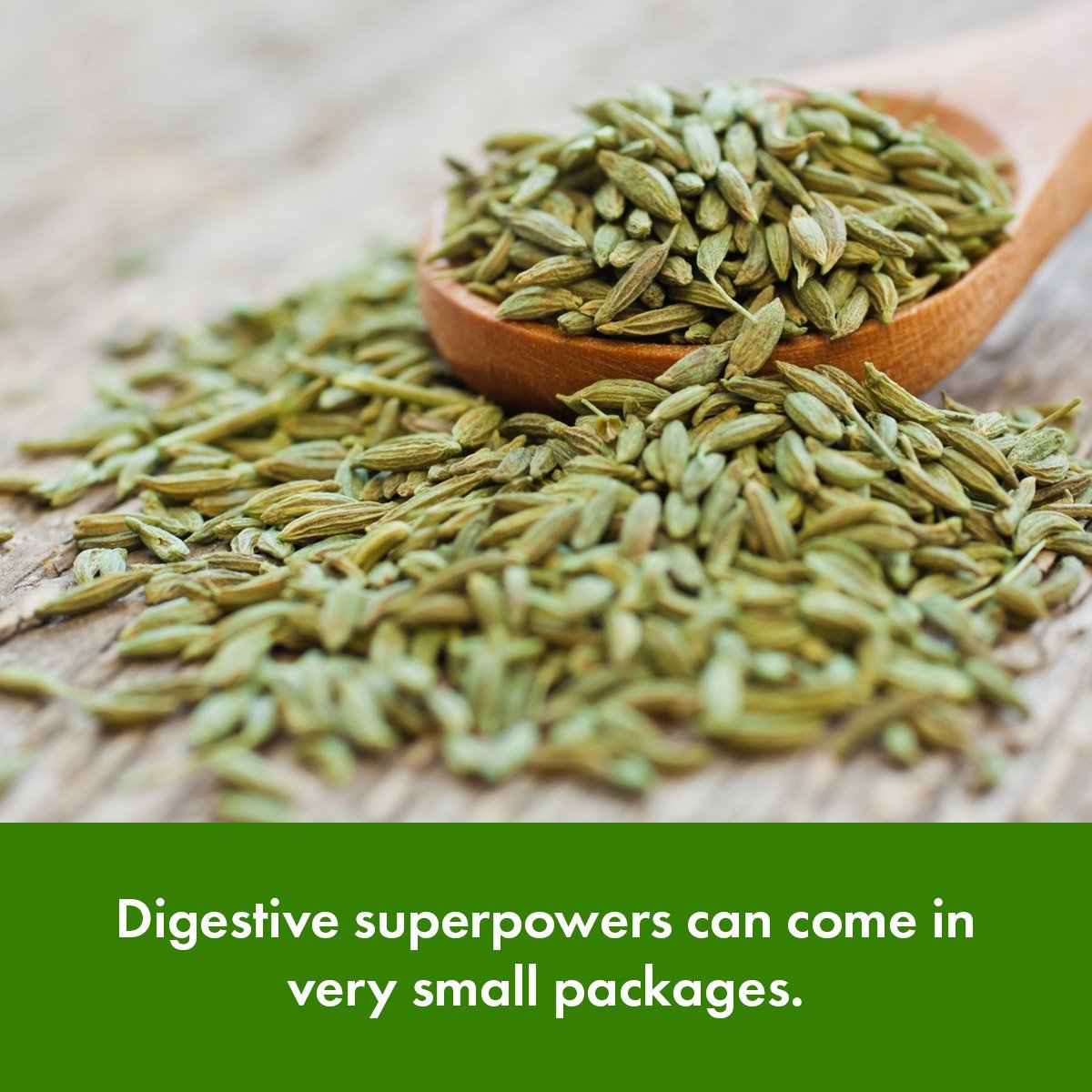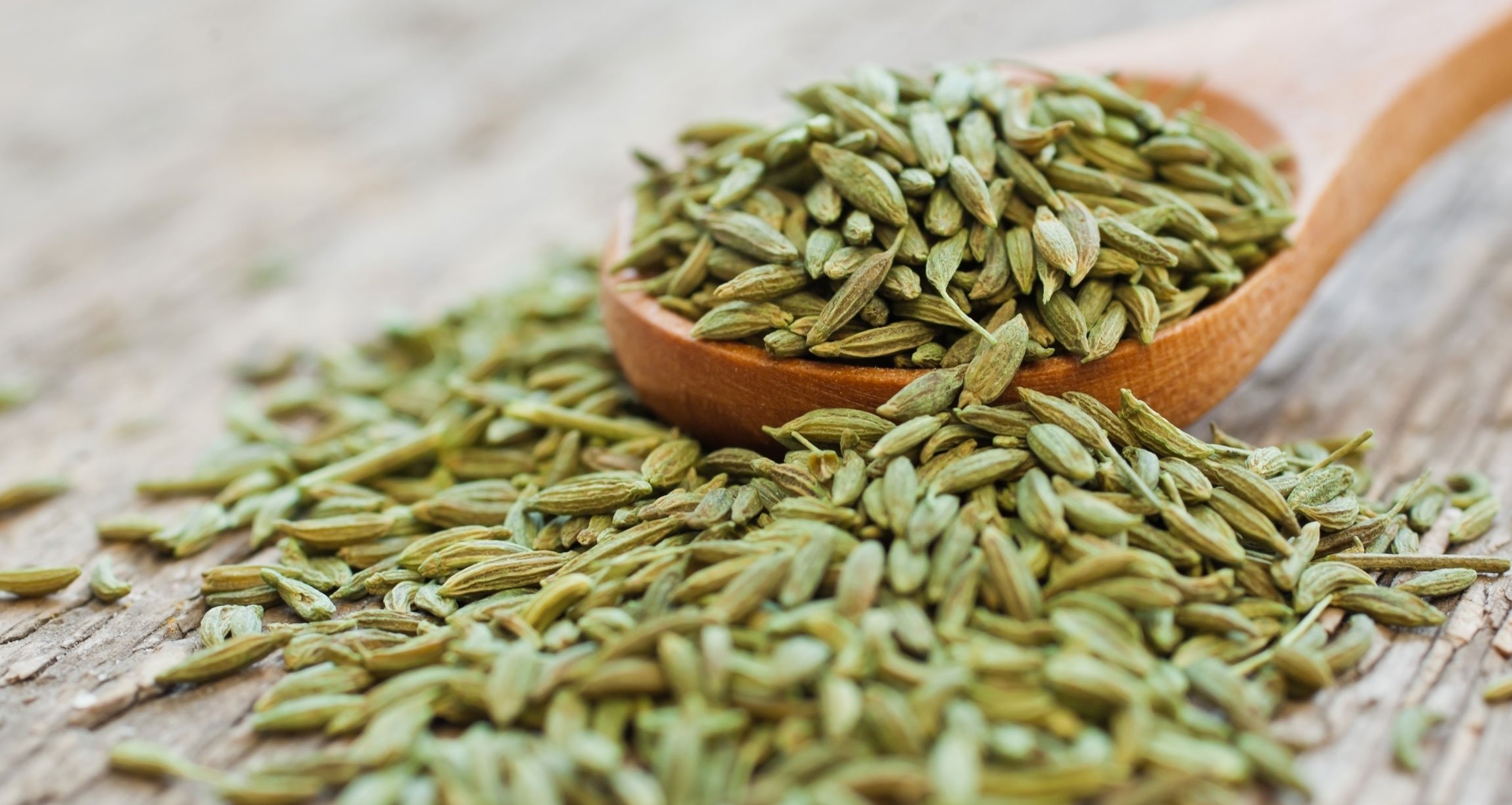These spices for digestion can help improve your digestion and ease your digestive distress.
By Ritamarie Loscalzo, DC, CCN • A version of this article was originally published on DrRitamarie.com
The traditional Western diet (processed and “white” foods) and all our vices (sodas, sugar, alcohol, smoking, lack of sleep, gulping down our meals, stress…) can reduce the efficiency of your digestive system.
Along with making conscious lifestyle decisions and eating whole foods and a lot of greens, I like to improve my digestion by adding flavorful spices that give me incremental digestive support. It’s easy to use them — and they taste good, too!
Spices Help Improve the Efficiency of Your Digestive System
Spices have been used throughout history as digestive stimulants.
In recent times, studies have shown that many spices stimulate the liver, resulting in it secreting bile that has a higher percentage of bile acids. Bile acids are important for fat digestion, as well as absorption, so making sure you have enough of them is important.
Many spices have also been found to stimulate the activities of pancreatic lipase, protease, and amylase. These enzymes help support a more efficient digestive system.
Some spices also help improve food transit time in the gastrointestinal tract. A sluggish GI tract allows time for more water to be absorbed out of the digested food; this can result in painful constipation. Additionally, the longer digested food is allowed to sit in your system before it is eliminated, the more prone it is to be preyed upon by unhealthy bacteria.
Some Spices Can Prevent Gas and Bloating

Many of my clients routinely tell me they experience gas and bloating. Maybe you do, too.
Guess what? Many spices have carminative properties. This means they help reduce bloating and flatulence — which is uncomfortable gas.
Some of The Best Spices For Digestion
1) Ginger
Ginger contains phenolic compounds which are known to relieve gastrointestinal irritations. It stimulates saliva and bile production. Animal studies have also demonstrated that ginger prominently enhanced intestinal lipase activity, which is an enzyme used in digestion.
Ginger reduces intestinal contractions by relaxing the intestinal muscles and allowing digested food to pass more easily. In fact, it reduces cramping of the stomach and bowels and may even help with menstrual cramping.
Ginger is good for reducing gas and bloating and is famous for addressing other gastrointestinal distress, such as nausea due to morning sickness and chemotherapy. Unlike Dramamine, ginger can stop your nausea without making you sleepy.
The Zingiberaceae botanical family to which ginger is a part of also includes turmeric and cardamom, which are both incredibly healthy spices themselves.
How to Use Ginger For Better Digestion
My favorite dishes to add ginger to are my warming soups.
Many of my clients drink ginger tea in the morning to wake up their sluggish digestion. I also sometimes add it to water, tea, or even hot water with lemon when I am traveling to settle things down after too much “hotel” food, or simply for a refreshing, cleansing drink.
I also use both fresh ginger root, as well as the dried spice, in smoothies and juices.
Note that ginger does have a blood-thinning action, so it should be used with caution by those taking blood-thinning medications. And you may want to avoid consuming ginger for two weeks prior to surgery and another week following surgery. Check with your doctor.
2) Coriander Seeds/Cilantro
Coriander seeds, which yield cilantro, have been used for thousands of years to help with digestion. Both coriander seeds and cilantro are healthy, but the seeds contain more health benefits for digestion.
Coriander has carminative properties, which means it helps with gas. It is also known to have antispasmodic and stomachic properties. It calms intestinal spasms that can lead to diarrhea so it may be helpful to some people having irritable bowel syndrome. Coriander can also help settle indigestion.
As an added benefit, cilantro is packed with phytochemicals, which are super antioxidants. It is also used to lower blood sugar and is being studied in animals for its potential cholesterol-lowering benefits.
Cilantro has also been researched as a heavy metal detoxifier. In rats, it has shown to suppress lead accumulation.
How to Use Coriander and Cilantro For Better Digestion
Coriander is sold in whole seeds and in powdered form. I always buy the seeds, as the oils dissipate very quickly once they’ve been ground, usually within a few months.
Use coriander as a delicious rub in stews, pickled dishes, and marinades. You can also add it to soups and smoothies.
Fresh cilantro is wonderful in hot and spicy dishes because of its cooling effect. Just chop up a little cilantro and throw it in whatever dish you are cooking. It encourages the production of supportive digestive enzymes that break down your food.
3) Cardamom
Cardamom is part of the ginger family, so no wonder it’s helpful for your digestion.
It has been used in Chinese and Ayurvedic medicine for centuries but is also backed by science as having actions that help relieve bloating and gas (aka carminative properties). It also has antispasmodic properties, as it can slow the rate of stomach muscle cramping.
Cardamom also stimulates the appetite along with easing gas, nausea, indigestion, and cramping. It helps to kill off any food-borne bacteria in the digestive tract, thus helping to protect against food poisoning and gastric distress.
Cardamom pods contain a compound called limonene, which is usually found in citrus peels. It is known to dissolve cholesterol-containing gallstones, as well as relieve heartburn and gastroesophageal reflux (GERD).
Cardamom also has antioxidant benefits, as well as being a good source of minerals, such as iron, manganese, calcium, and magnesium.
Cardamom works well as a diuretic and can reduce bloating, water retention, swelling, and edema.
How to Use Cardamom For Better Digestion
Cardamom is often used in sweet and savory dishes. And it can be prepared as a delicious, warming tea by placing four cardamom pods in two cups of water and simmer for 30 minutes. Sweeten with stevia, if desired.
Cardamom pods can be chewed on to relieve tooth and gum pain, as well as prevent infection.
4) Fennel Seeds
Fennel stimulates the production of gastric juices and is another great spice having carminative properties. It is often used as an after-dinner digestive aid. It also has antispasmodic properties.
Fennel seeds are a very rich source of dietary fiber as well. It consists of metabolically inert insoluble fiber, so it increases the bulk of the food you eat as it goes through your digestive system. This eases constipation problems. Its fiber helps protect your colon.
Fennel also contains a variety of antioxidants, such as quercetin, which is thought to offer protection from aging and diseases, including cancer.
How to Use Fennel Seeds For Better Digestion
A good trick (thanks to my friend and peer, Dr. Alan Christianson) to reduce bloating and gas, is to heat fennel seeds on low in a skillet with some sea salt.
Let them get slightly brown, and then store them in a tightly closed container. You can add a few pinches of these slightly cooked seeds to any of your dishes. It really works!
6 Other Spices That Can Help Digestion
- Turmeric — This Indian spice aids digestion while soothing your digestive tract. It has been found to help relieve heartburn, reduce stomach pain (due to its anti-inflammatory and antibacterial compounds), reduce flatulence, and more.
- Cumin — Cumin is another great spice for digestion and is great for heartburn.
- Lemon Balm — One of my digestive spice favorites is lemon balm!
- Garlic — Garlic protects gut immunity.
- Fenugreek — Fenugreek acts as a natural digestive and helps flush out toxins from the body.
- Cinnamon Bark — Warming cinnamon bark is a mild but useful remedy for sluggish digestion. The German Commission E recommends it for loss of appetite, dyspeptic complaints, bloating, and flatulence.
There are other great spices for digestion. Just go to a reputable herb and spice shop online and do a little research. You’ll find that a lot of the Italian spices are also good for digestive support.
Go wild! Find some new tastes that also will help your tummy and health.
How to Store Spices
Remember to store your spices in clean, airtight containers away from the heat and light. I keep a few of my spices that seem to spoil too quickly in the fridge.
Let us know in the comments:
-
How have you used spices for digestion?
-
Which spices are your favorites?

Featured Image: iStock.com/Furtseff




